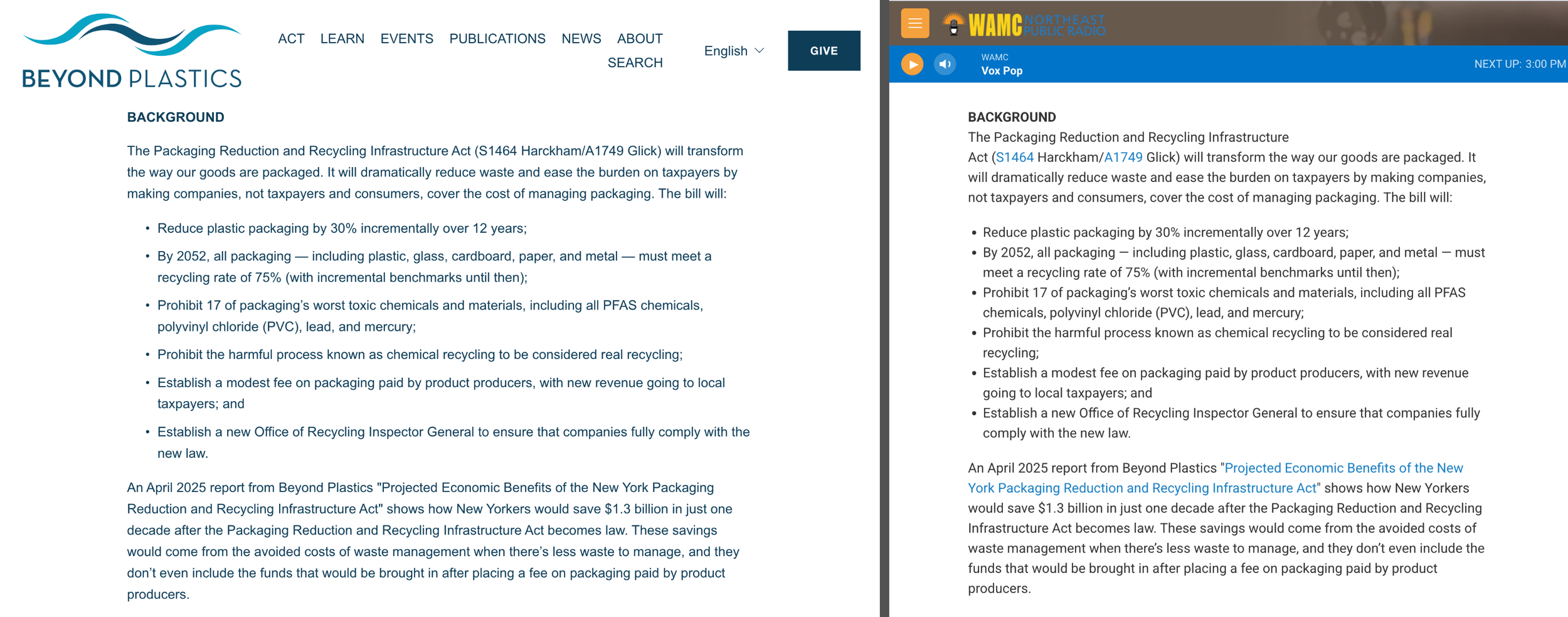In the world of public radio, where "independent" journalism prides itself on digging deep, WAMC Northeast Public Radio just served up a masterclass in copy-paste ethics—or lack thereof. On September 15, they published an article on a rally for New York's Packaging Reduction and Recycling Infrastructure Act (PRRIA), but the "BACKGROUND" section? Entirely lifted, word for word, from a Beyond Plastics press release, without attribution. Recall that Beyond Plastics is the activist outfit trying to force the bill through the legislature. We've caught them spreading misinformation about PVC many times.
The article, as written, reads like an advertorial for the bill. "The Packaging Reduction and Recycling Infrastructure Act (S1464 Harckham/A1749 Glick) will transform the way our goods are packaged," it states. "It will dramatically reduce waste and ease the burden on taxpayers by making companies, not taxpayers and consumers, cover the cost of managing packaging. The bill will..." And on it goes, bullet points and all, mirroring Beyond Plastics' press release from September 13, 2025 and its April 2025 economic report.
For context, PRRIA is an onerous extended producer responsibility bill aimed at curbing New York's use of plastic packaging. Championed by Assemblymember Deborah Glick and Senator Pete Harckham, it mandates a 30% cut in plastic packaging over 12 years, a 75% recycling rate for all packaging by 2052, restricts a wide variety of chemicals used to make packaging, and slaps fees on producers to fund local recycling.
WAMC's plagiarism constitutes a glaring ethics breach. That would be bad enough on its own, but it’s especially offensive given how unpopular the PRRIA is—the bill failed to pass twice—and the exorbitant penalties it imposes on New Yorkers.
A just-updated York University study warns of unrealistic savings claims and real economic hits, including more than $1.2 billion in costs to local industry, a significant increase from the $500 million originally estimated. However, the study adds that this hefty sum won't be paid by industry alone. "Producers, seeking to maintain profitability and competitiveness, will transfer a significant portion of these costs to consumers by raising prices on packaged goods, food products, household items, and electronics," the researchers note (p 19).
The media's job is to report critical facts like the ones outlined above to the public so they understand how the PRRIA would impact their living standards. Did WAMC neglect its objectivity obligations because of a cozy relationship with Beyond Plastics Executive Director Judith Enck, who regularly appears on WAMC's "The Roundtable" podcast series? Regardless, WAMC—funded by listeners expecting rigor—owes an apology, a correction, and a pledge to do more than literally copying activist talking points. New Yorkers deserve coverage that weighs those claims against economic realities—not recycled press releases.


